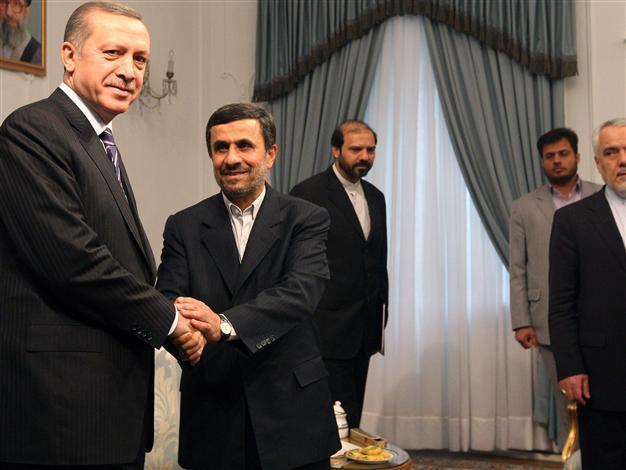Iranian suspicion grows over Turkey's regional role
DUBAI - Reuters

Iranian President Mahmoud Ahmadinejad shakes hands with Turkish Prime Minister Recep Tayyip Erdogan (L) upon the latter's arrival for a meeting in Tehran on March 29, 2012 during his two-day official visit to Iran. AFP PHOTO/ATTA KENARE
A senior Iranian political figure has spoken out against
Turkey hosting Iran's next talks with world powers on its disputed nuclear programme, in the latest anti-Turkish broadside from politicians in
Tehran, Fars news agency reported late yesterday.
Last month Turkey offered Istanbul as the venue for talks expected to take place on April 13, a proposal which appeared to gather momentum last week when Iranian Foreign Minister Ali Akbar Salehi said Istanbul would be "the best option".
Turkey has repeatedly backed Iran's right to develop peaceful nuclear technology. The United States and its allies suspect Tehran of covertly working on nuclear weapons and have imposed tough new sanctions on its financial and energy sectors.
Tehran, which says its nuclear activities are purely peaceful, has agreed to renewed talks with the five permanent members of the Security Council - the United States, Russia, China, France and Britain - and Germany this month.
Once-warm Iranian-Turkish ties have cooled over the past year due to the popular revolt in Syria, Iran's closest Arab ally and a steadfast backer of Syrian President Bashar al-Assad.
Turkey, a former friend of Assad, has demanded he halt a bloody crackdown on his opponents and step down.
"Given the fact that our friends in Turkey have failed to fulfill some of our agreements, the talks... had better be held in another friendly country," said former presidential candidate Mohsen Rezaie, Fars News reported.
Speaking to staff of the Economic Cooperation Organisation, a regional trade body with offices in Tehran, Rezaie did not specify what Turkey's failures were, but said that Baghdad, Damascus or Beirut would be a more suitable venue.
"Offering Istanbul as the venue for the upcoming talks ... might give this wrong impression to the opposite side that Iran has grown weak and is in weak conditions," he added.
Rezaie has been an influential figure in Iranian politics for more than three decades since he was appointed commander in chief of the Revolutionary Guards, the elite force created to protect Iran's system of theocratic rule.
A critic and electoral rival of President Mahmoud Ahmadinejad in 2009, Rezaie is now secretary of the Expediency Council, an influential body that advises Iran's Supreme Leader Ayatollah Ali Khamenei, who directs nuclear policy.
His comments are a rare public criticism of neighboring Turkey, whose prime minister, Tayyip Erdoğan, stressed the value of relations with Iran during a visit to Tehran last week.
Iran's theocratic leadership has welcomed talk of more economic cooperation with Turkey to offset the impact of sanctions on the Iranian economy. However, some Iranian lawmakers are increasingly critical of Turkey's regional role.
Iranian MP Esmail Kowsari has accused Turkey of being a messenger of the United States and Israel, saying that "it would surely be hated by its own people and other nations in the region because it is hand in hand with the arrogant (Western) powers," the Iranian Labour News Agency reported on Monday.
Kowsari ridiculed Turkey's hosting on Sunday of a "Friends of Syria" of mostly Western and Arab countries, which he described as only enemies of Syria.
Parliament Speaker Ali Larijani called the Istanbul event a "conference to bribe Israel" and said regional nations that described Syria as a dictatorship were no better themselves, Fars reported.
Tensions with Turkey over Syria are awkward for Iran, which needs all the regional friends it can get to mitigate the effects of increasingly fierce Western economic sanctions.
Iıran,
